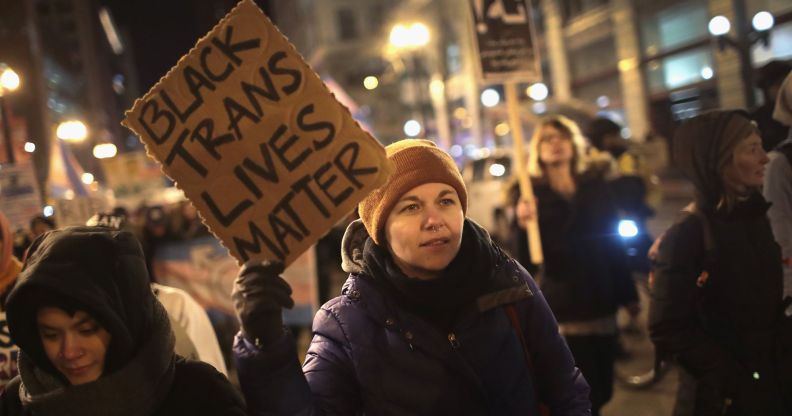Queer people of colour don’t think they will live as long as their white peers, study finds

These latest figures in particular led The Trevor Project to highlight the need for investment in LGBTQ+ mental health care. (Scott Olson/Getty Images)
Large numbers of queer young people of colour in the US believe they have a low life expectancy compared with their white peers, a new study has found.
The research for LGBTQ+ youth mental-health charity The Trevor Project showed that, overall, 58 per cent of young queer people believe there is a high chance they will live to at least the age of 35, while 34 per cent view their chances as low. The remaining respondents were unsure.
The report, which surveyed 28,524 LGBTQ+ people between the ages of 13 and 24, found that 59 per cent of young LGBTQ+ people of colour think they will live to 35 and beyond, while 69 per cent of their white peers think there is a high chance they will live to the same age.
That disparity was even greater for transgender and non-binary people (53 per cent), compared with cisgender people, with 79 per cent of those surveyed believing they would live at least that long.
Steven Hobaica, a research scientist at The Trevor Project, told Advocate that as well as factors such as supportive parents and access to gender-affirming care, people who expressed high levels of “life purpose” were more likely to expect to live longer.
“We found that white LGBTQ+ young people were more likely to endorse a higher chance of living past 35 compared [with] their peers of colour, possibly due to generally having less stressful life experiences,” Hobaica said.
“It is well documented that youth who hold multiple marginalised identities, such as LGBTQ+ youth of colour, report higher rates of both stressful life events and mental health problems than their white LGBTQ+ peers, which may help explain these findings.”
‘Change is needed’
In addition, the research showed that queer people who believed they had a lower life expectancy were also more likely to have had recent bouts of anxiety (82 per cent) and depression (77 per cent).
This group also reported higher rates of self-harm in the past 12 months (77 per cent), suicide consideration (69 per cent), and suicide attempts (28 per cent) compared with respondents who thought they would lie longer (41 per cent, 24 per cent, and six per cent, respectively).
These latest figures in particular led The Trevor Project to highlight the need for investment in LGBTQ+ mental health care.
“Systemic policy change is needed to address the mental health of LGBTQ+ youth,” Hobaica said.
The study comes after a 2023 report found a quarter of Black trans and non-binary young people in the US had attempted suicide, and that Black trans youth had more “indicators” of poor mental health than their cisgender Black peers.
Several factors compounded this, with Black trans and non-binary youth experiencing higher levels of depression, anxiety, homelessness and discrimination.
“Simply put, the mental health of Black transgender and non-binary young people is a public-health crisis,” Dr Myeshia Price, a senior director of research science at The Trevor Project, said at the time.
Suicide is preventable. Readers who are affected by the issues raised in this story are encouraged to contact Samaritans on 116 123 (www.samaritans.org), or Mind on 0300 123 3393 (www.mind.org.uk). Readers in the US are encouraged to contact the National Suicide Prevention Line on 1-800-273-8255.
How did this story make you feel?

